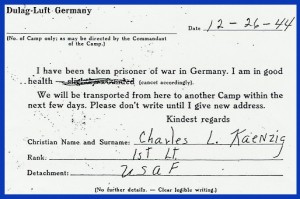Late in December 1944, John Kaenzig of Versailles, Kentucky received the telegram that every parent of a soldier dreads. His son Charles, an Air Force lieutenant, was reported missing in action, his plane shot down over Italy. As John read the telegram, a Kreigsgefangenenpost (prisoner of war post) signed by Charles was on its way to Kentucky. “I have been taken prisoner of war in Germany,” the Postkarte read. “I am in good health.”
In February 1945, John Kaenzig received two more extraordinary communications. One was from the pilot of Charles’s downed aircraft, describing its destruction by anti-aircraft fire. He had seen Charles parachute from the plane and was hopeful he had survived, because Italian civilians (who had helped the pilot to safety) were friendly and the Germans were thought to treat prisoners humanely. The second was a postcard from a couple in New York City who had picked up a German short-wave radio broadcast carrying a message from Charles “Kinsie.” He had arrived at a permanent POW camp and was in good health and spirits. “With our sincere hope that he will return to you safely and soon,” the couple had addressed the postcard to his mother.
Charles did return after his liberation by Russian troops on May 1. While he waited in Germany, then France, to be shipped home, he wrote cheerfully to his family. “These last ten days out from behind barb wire have been wonderful,” he declared. “Going to be mightly nice to get back on the farm for awhile.”
This collection of letters by and about Charles Kaenzig is available at WKU’s Special Collections Library. Click here for a finding aid. For more World War II collections, search TopScholar and KenCat.

